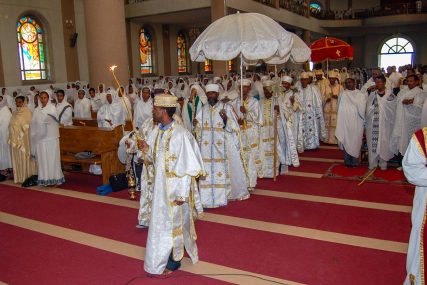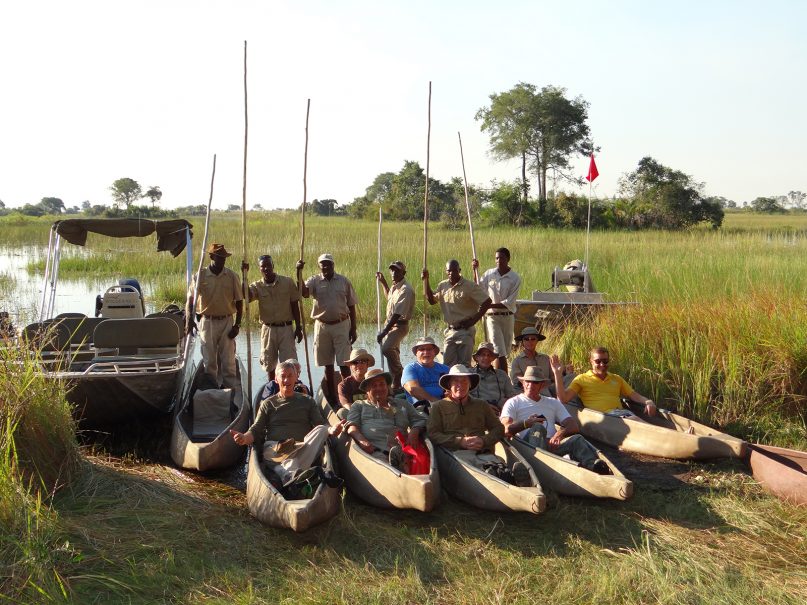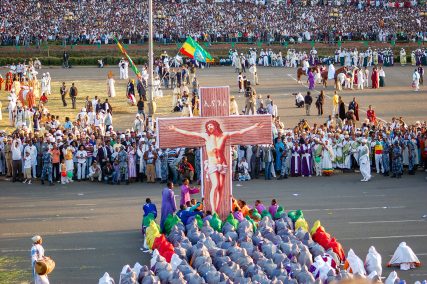CHICAGO (RNS) — Dan Ware hoped to visit Ethiopia this fall with a group of fellow travelers, touring the country’s famed churches and meeting with leaders of one of the oldest Christian traditions in the world.
Now that trip is in jeopardy.
All because Ware and many of his traveling companions are gay.
“You can’t come to Ethiopia for tours. You’re not human beings. You are less than animals,” reads one email Ware received this week as president of Toto Travel, which organizes trips for gay and lesbian travelers, as well as their close friends and family.
That’s typical of the hundreds of messages he said he has gotten since an Ethiopian blogger first criticized Toto’s “Treasures of Ethiopia” tour, set for late October.
Now the tour may be canceled due to the backlash primarily from religious groups in the African country, where most people belong to the Ethiopian Orthodox Church and consensual same-sex relations are criminalized.

Ethiopian Tewahedo Orthodox Church leaders walk in a procession during a morning mass in Addis Ababa on September 24, 2010. RNS photo by Fredrick Nzwili.
“It just is incredible for a religion that preaches the teachings of Jesus Christ — which are all about love and tolerance, treating people with love and equanimity — that they would treat us this way. It just boggles the mind,” said Ware, who was raised as a Pentecostal Christian before converting to the Baha’i faith.
He now simply believes in what he calls “the power of love.”
Ware founded Toto Tours nearly 30 years ago when he left his job working at the Baha’i National Center in the Chicago area after co-workers learned he was gay.
In that time, he said, Toto’s gay and lesbian customers have had good experiences. The travelers have learned something new, as do the people they meet during the trips.
“What happens when you go in a group to another culture is you learn, you’re changed, your perspectives are altered. And, you know, the same happens with the people you visit. They go, ‘Wow, we’ve never met gay people before,'” he said.
“It’s like we’re ambassadors, and always it has been a positive thing.”
Toto’s planned 16-day tour of Ethiopia, still shown on its website, includes visits to holy sites such as the ancient rock-hewn churches in Lalibela and the Debre Berhan Selassie church in Gondar.
The website describes “two exciting days” exploring Lalibela and the opportunity to meet with clergy there to discuss the history of the churches. It also describes the country as the “ancestral home to all of mankind,” noting its “fascinating history stretching back more than 3,000 years to the fabled reign of the Queen of Sheba and King Solomon.”

The Church of Saint George, one of many churches hewn into the rocky hills of Lalibela. By Bernard Gagnon – Own work, CC BY-SA 3.0.
“This expedition takes you on a historical and cultural journey to some of the most remote areas of Ethiopia for the adventure of a lifetime,” the site reads.
Ware said he particularly was looking forward to seeing the churches in Lalibela he has heard so much about and getting to know and interact with the people of Ethiopia, which he called a “beautiful country.”
Then he started getting threats.
Many of the messages, which started in late May, included what Ware described as “colorful descriptions of how we’re going to be killed if we get off a plane in Addis Ababa — a menu of colorful deaths including beheading, burning at the stake, buried alive, shot, stoned.”
The tour — particularly its visits to holy sites — had caught the attention of Ethiopian blogger Seyoum Teshome, who criticized it in a Facebook post as shocking, unwanted and shameful.
Soon, religious groups started demanding the government stop the trip.
“We are asking the government to stop the travelers with the gay company from visiting our historical places. We are warning those Ethiopians who are cooperating with this evil thing,” Tiguhan Kesis Tagay Tadele, the secretary general of the Inter-Religious Council of Ethiopia, said at a June 3 news conference.
The council unites seven religious groups, including Christian and Muslim institutions.
In Ethiopia, homosexuality often is treated as a taboo subject and condemned on the basis of tradition, religion and law. Sexual activity by lesbian, gay, bisexual and transgender people is punishable with jail time, and 97% of Ethiopians think homosexuality should not be accepted by society, according to Pew Research Center data.
Dereje Negash, a vice chairperson of the Sileste Mihret United Association, an Ethiopian Orthodox Church organization, at the same news conference issued a warning.
“They can’t come to Ethiopia and visit Lalibela and other historical places because homosexuality is a crime. If they (come) here, they will be damaged (attacked),” Negash said.
Church administrators at the Lalibela churches have written to the government’s Ministry of Tourism, saying they would not receive the Toto travelers.
According to news reports, the government has said that while it welcomes the tour and encourages everyone to visit the country, it recommends respect for Ethiopian culture. The website Ethiopia24 quoted the government as warning travelers to “be careful not to deviate from the norm of the local people.”
At least 68 countries in the world still have laws making consensual same-sex relations illegal, according to Human Rights Watch. Of those countries, 33 are in Africa.
- Members of the Ethiopian Tewahedo Church celebrate the annual holiday of Maskel at the Maskel Square in Addis Ababa, the Ethiopian Capital. The celebrations mark the finding of the “True Cross” by Roman Empress Helana (St. Helena) in the fourth century. The church follows the Gregorian Calendar and the feast is marked on September 14 each year. RNS Photo by Fredrick Nzwili.
- Members of the Ethiopian Tewahedo Church celebrate the annual holiday of Maskel at the Maskel Square in Addis Ababa, the Ethiopian Capital. The celebrations mark the finding of the “True Cross” by Roman Empress Helana (St. Helena) in the fourth century. The church follows the Gregorian Calendar and the feast is marked on September 14 each year. RNS Photo by Fredrick Nzwili.
While Ethiopia is religiously diverse, the overlap between the Ethiopian Orthodox Church and Ethiopian culture is strong, according to Felix Horne, senior researcher on Ethiopia and Eritrea for Human Rights Watch. Horne said even many “young liberally minded Ethiopians still have quite conservative views on homosexuality that often dovetail with the Orthodox Church.”
Still, the researcher said, that’s starting to change. More young LGBTQ activists — particularly in the Ethiopian diaspora — are beginning to speak out online.
And Horne said he has never seen anything like the “ferocity” of the pushback and public outcry to Toto Tours’ planned trip to Ethiopia. Press conferences by religious groups denouncing a tour company are “unheard of in Ethiopia,” he said.
“I was quite surprised by it. I think part of it is the growing power of social media in Ethiopia,” he said.
Toto Tours has visited other countries where same-sex relationships are illegal, according to Ware.
“We fly under the radar,” he said.
But, Ware said, he doesn’t think the threats he’s received have to do with the fact that many Toto travelers are gay or lesbian. Ethiopia recently welcomed Irish Prime Minister Leo Varadkar, who is openly gay, Ware pointed out.
Rumors circulating online claim the travelers are planning to “desecrate” the country’s holy sites, he said.
“We weren’t there to promote homosexuality. We weren’t there to beat the drum for the rights of the gay people of Ethiopia. We weren’t going to raise the (pride) flag at the churches, the holy places, like they think that we are,” he said.
“We’re not involved in any of that. We’re merely tourists who travel together as for a sense of solidarity and comfort.”
Ware said he is waiting to hear from the Ethiopian government before announcing whether he will cancel Toto’s “Treasures of Ethiopia” tour for the safety of its travelers.
He has been in touch with officials at the U.S. Embassy in Ethiopia, who, he said, told him they couldn’t guarantee the group’s safety amid the backlash. He also has reached out to the FBI after some YouTube creators began sharing his home address.
Meantime, Ware said, he is buoyed by the news Monday (June 10) that Botswana has overturned its law criminalizing homosexuality. It joins 21 other African countries — such as Burkina Faso, Congo and Mali‚ where homosexuality has never been against the law.
Earlier this month, Angola also lifted its ban on homosexuality.
And Ware received a message Tuesday from someone who self-identified as an “Ethiopian national.”
“I would like to apologize on behalf of peaceful, hospitable Ethiopian people for the thuggish-style death threats your team received over the past few weeks. I would like you to know that not everyone is against your visit to our nation.”
(Fredrick Nzwili reported from Nairobi, Kenya.)







